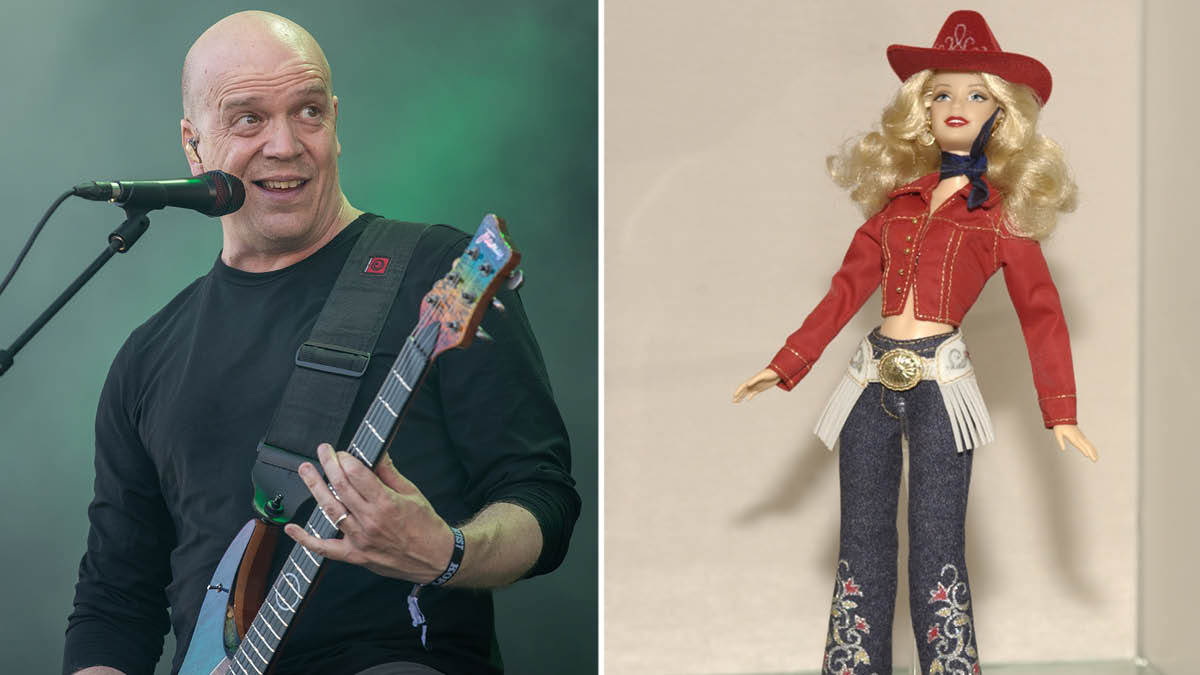Devin Townsend replaced a track from his new album because of... Barbie Girl?
It’s Hevy Devy nil, Barbie Girl 1, as HoneyBunch – which features Nile Rodgers on guitar – was removed from Lightwork over copyright clearance issues with Aqua's 1997 pop hit

Devin Townsend has revealed that he had to shelve the song HoneyBunch from his new album over copyright issues surrounding the Aqua’s 1997 Europop smash-hit, Barbie Girl.
You can still find the track advertised by some outlets, but speaking to Guitar World, Townsend confessed that a mix-up over rights issues meant that he had to swap it out at the last minute.
HoneyBunch, which featured funk icon Nile Rodgers on guitar, used the melody from Barbie Girl, which Townsend thought was okay until realising that, on the contrary, he needed clearance to use it.
“We had recorded this song called HoneyBunch, which has this [melody] taken from Barbie Girl by Aqua,” Townsend said. “I thought the loophole was that if you re-record the sample, you could use it because it’s not their version. But it turns out that’s not the case!”
I’m strangely thankful that at the last minute I got to complicate it a little bit
Quite how Townsend and Rodgers combined on a track appropriating a melody from Barbie Girl will remain one of life’s mysteries for now. In its stead came Heartbreaker, a song that was originally slated for Lightwork’s bonus disc, Nightwork, and one that reflects Townsend’s proclivity for downtuned prog metal guitar. It provides a neat contrast to what had gone before, and in Townsend’s opinion, all’s well that ends well.
“It’s not the original vibe; however, on some level I think it makes it better for me,” he said. “I’m strangely thankful that at the last minute I got to complicate it a little bit.”
The legal rectitude of a song referencing Aqua’s hit single was not the only obstacle Townsend faced when making the album.
Want all the hottest music and gear news, reviews, deals, features and more, direct to your inbox? Sign up here.
First off, the pandemic changed Townsend’s plans. He could no longer continue writing Lightwork in that headspace, and so pivoted to The Puzzle, an experimental and improvisational album of “chaos music” that had some 60 musicians improvising over Townsend’s improv.
In his promo video for Lightwork, Townsend acknowledged that The Puzzle was challenging for some of his audience.
“I can say as much as I want about, ‘Well, it’s more of a metaphor, of 60 people stuck at home, virtually improvising on top of something that was like a one-take thing for me, and that’s supposed to be a representation of how society interacts with your motives.’ But you go so far up your own ass with that. It’s just artsy-fartsy BS… I think.”
That said, he maintains that The Puzzle, and its companion piece, Snuggles, were 100 per cent necessary.
“It was the most visceral reaction I had to the whole pandemic era,” he said. “And how that informed Lightwork, was that it, prior to starting The Puzzle, I had started writing Lightwork, but I knew that, while I was working on it in the beginning, that I wasn’t emotionally ready to make it what it needed to be.
“From the very beginning, I wanted Lightwork to be clean, and succinct, and healthy, and big, and simple, and I wanted it to be something that could be accessible to people who are looking for music or art that doesn’t impose all that trauma that The Puzzle very clearly had on them.”
Furthermore, when tracking Lightwork with producer Garth Richardson, a tree fell on the studio and took out the power. It never rains but it pours…
Lightwork is out now via Inside Out.
Jonathan Horsley has been writing about guitars and guitar culture since 2005, playing them since 1990, and regularly contributes to MusicRadar, Total Guitar and Guitar World. He uses Jazz III nylon picks, 10s during the week, 9s at the weekend, and shamefully still struggles with rhythm figure one of Van Halen’s Panama.
